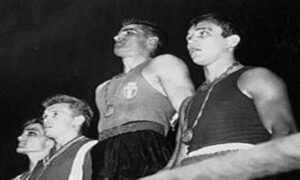Ringside Report Looks Back at Boxer Jimmy Lloyd (1939-2013)
 Jimmy Lloyd, Leszek, Drogosz Giovanni, Benvenuti and Yuri_Radonyak 1960
Jimmy Lloyd, Leszek, Drogosz Giovanni, Benvenuti and Yuri_Radonyak 1960
By Donald “Braveheart” Stewart
They do say that if you remember the 1960’s, then you weren’t really there. I was born mid-decade so I have an excuse for not remembering much, though I think 1968 was the year of my very first memories, according to my mother. Olympian Jimmy Lloyd, 10-7-3, 4KOs had plenty of reason to remember that decade as it began with him getting a bronze medal at the Tokyo Olympics of 1960.
But his legacy and his relationship to the sport of boxing was way more than just a medal. Like so many of his era and many who have come after him, and a few who graced the square circle before him, whilst the pinnacle of amateur boxing was his highest achievement it was far from his only one. Unfortunately, a decade ago, Lloyd lost his life when 73 years old. Though he turned over as a professional, for him there were no huge paydays under bright lights and media scrutiny. His life was spent in the boxing halls giving a precious commodity to those around him – his experience and such wealth it was. In his obituary, in the Liverpool Echo, I was struck by the tone of appreciation and love that was the outpouring of recognizing a hero: not for the huge things he did but for the everyday sacrifice and support he gave to others.
Like so many sports, without people like him, the sport would wither and die.
Born just before the world was to delve into conflict in July 1939, Jimmy Lloyd was a boy boxer who started at the age of 9, and like so many of his time, was following the pathway laid out by siblings – in his case two elder brothers. He won a national schoolboys title and reached the finals of the Junior ABAs, at one point claiming a National Amateur Boys Club title.
His entry into competitive boxing coincided with his time in the army but the 1960s was the decade in which he shined. As well as the Olympic medal at the beginning of the decade he was the Amateur Boxing Association (ABA) champion at light middleweight in 1962.
He boxed for England and in January 1960 scored a victory over Scotland’s Bobby Keddie which was notable as Keddie was a fearsome knockout artist. His amateur pedigree further enhanced by beating an Olympic champion, Jerzy Kulej, not once but twice.
But before getting to the ABA final, there was the small matter of the Olympics and Lloyd battled through Mohamed Faragalla of Sudan in the first round by knockout, then beat Vasile Negu of Romania also by knockout – both in the second round – which saw him in the quarterfinals in a tougher contest and it took points to beat America’s Phil Baldwin for the first time.
In the semifinals he had the misfortune to come up against the future gold medalist and two weight professional champion in Nino Benvenuti, hearing the final bell but not getting his hand raised thereafter meant he settled for bronze. It was the Olympics a young Cassius Clay made his presence felt and given that Lloyd beat one of his compatriots, we can but speculate if the great man was in the hall to watch Lloyd box.
Having beaten Baldwin in the ring in Tokyo, Lloyd was to meet him in the ring again when England took on the US in 1961 – Lloyd got the double over Baldwin.
In 1962, Lloyd was to become the ABA champion after beating Johnny Elliott in the final at the Wembley Arena.
That same year he turned professional and in a short career, made his debut in September at the Empire Pool, Wembley and drew with Sugar Gibiliru. His only professional belt was the Southern Area championship which he won on the 1st of March 1963, at Bermondsey Baths in London by beating Dennis Read on points. His final fight, on the 9th of May, 1966, 3 days after my 1st birthday was at the Hilton hotel in Mayfair, London when he lost by being stopped in the 5th round by Liam Mullen.
Following retirement from the sport he became a mechanic, welder, lorry driver and a security guard but far more importantly he was co-founder of the Skelmersdale Amateur Boxing club alongside his brother, Alan. For 35 years he trained youngsters from the club and gave far more to the sport than he ever received.
Click Here to Order Boxing Interviews Of A Lifetime By “Bad” Brad Berkwitt

